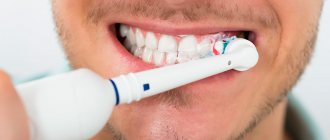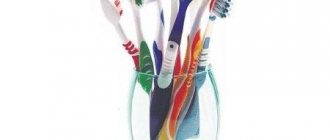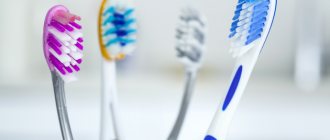Oral hygiene is important at any age. According to the recommendations of leading dentists, parents should teach their child to use a toothbrush from the very first tooth of the baby. Without a doubt, the choice of cleaning products must be approached with all responsibility so as not to harm the health of the little man. The editors of the Yanashla website have prepared for you a rating of the best children's toothbrushes.
At what age can you start brushing your teeth?
Parents need to start taking care of their child’s oral hygiene even before the first teeth appear. Even completely bare mucous membranes are a favorable environment for the growth of bacteria. Before the age of six months, it is, of course, too early to use a brush. But in this case, you can resort to clean gauze soaked in boiled water at room temperature and wrapped around your finger. This is a suitable option to carefully treat the mucous membrane and remove plaque.
Clean gauze should be used before teething
With the appearance of the first primary incisors at 6-7 months of age, you should continue to clean soft and hard tissues using gauze. But you can now switch to a special silicone fingertip - it is also designed for gentle treatment of gums, tongue and the first strong teeth. You need to perform the procedure twice a day - just like with standard cleaning in adulthood.
The next stage usually begins at the age of 1 year. At this time, you can already move on to the first brush, but cleaning should be carried out under close parental supervision. Starting from 3 years of age, the child should be able to carry out the procedure independently.
Terms of use
Children under 5-7 years old must use such devices under adult supervision. First, the parents themselves brush the baby’s teeth, then they just stay nearby.
The cleaning process differs from the usual mechanical one. You need to place the rotating head on one area at an angle of 45˚. Hold it without pressing for 10 seconds, then move it a little. It is necessary to pay attention to all surfaces, not forgetting the chewing, distant teeth, from the inside.
Attention! Children are recommended to use this brush no more than 2 times a week.
Features of oral care during teething
The timing of the eruption of the first milk teeth is individual for each baby. Usually this process begins between 4 and 7 months, and for some, only in the first year of life. This is a delicate period that requires increased attention to the condition of the oral cavity. Experts in pediatric dentistry provide several specific recommendations in this regard:
- Excess salivary fluid must be systematically removed to prevent irritation around the mouth. To do this, you can use a clean napkin or the edge of a towel,
- It is recommended to give the baby special teethers, you can buy these at the pharmacy,
- You should not use teethers with liquid inside - there is always a risk that they will burst. You should also not refrigerate them in the freezer, as this can cause injury to your gums. It is enough for the teether to lie in the refrigerator for only 15 minutes,
- a light massage of the gums with a clean finger has worked well,
- Every time after feeding, the gums should be wiped with gauze soaked in boiled water at room temperature. Some experts allow the use of special anti-inflammatory solutions, but it is better to consult with your pediatric dentist in person on this matter.
Teethers will help ease the baby's teething process.
“My son is 1.5 years old, but the pediatrician is categorically against any brushes until he is two years old. He says there is nothing to clean there, just use a fingertip. In addition, this procedure will be too traumatic for him, and the enamel can be accidentally damaged. So I just clean my tongue with a bandage soaked in water, and my teeth separately with a fingertip.”
Ekaterina F., from correspondence on the woman.ru forum
During the period of formation of the primary occlusion, the child’s body weakens, and a slight, but still, decrease in local immunity occurs. This means that it is at this time that the baby is at greater risk of contracting an infection. The gums are already inflamed, so you should not carry out additional manipulations too often and intensively. Care should be as gentle as possible, but attentive and regular.
Dentists' opinion
View this post on Instagram
Save so you don’t lose, and don’t forget about ❤️









